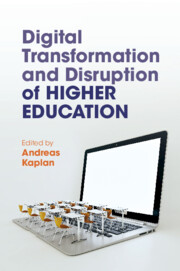Book contents
- Digital Transformation and Disruption of Higher Education
- Digital Transformation and Disruption of Higher Education
- Copyright page
- Contents
- Figures
- Tables
- Contributors
- Preface
- Chapter 1 Nothing Is Constant Except Change
- Part I (R)evolution of the Higher Education Sector
- Part II Changes in Teaching Formats
- Part III Changes in Teaching Content
- Part IV Networking and Social Activities
- Part V Certification and Diplomas
- Part VI Careers and Professionalisation
- Chapter 23 About University Career Services’ Interaction with EdTech
- Chapter 24 About Training Educators to Become Drivers for Change
- Chapter 25 About Instructors’ Readiness to Teach Online
- Chapter 26 About Precarious Faculty and Their Digital Disruption
- Part VII Futuristic and Ultramodern Higher Education
- Part VIII Higher Education in Motion
- Editor’s Biography
- Index
- References
Chapter 23 - About University Career Services’ Interaction with EdTech
from Part VI - Careers and Professionalisation
Published online by Cambridge University Press: 09 June 2022
- Digital Transformation and Disruption of Higher Education
- Digital Transformation and Disruption of Higher Education
- Copyright page
- Contents
- Figures
- Tables
- Contributors
- Preface
- Chapter 1 Nothing Is Constant Except Change
- Part I (R)evolution of the Higher Education Sector
- Part II Changes in Teaching Formats
- Part III Changes in Teaching Content
- Part IV Networking and Social Activities
- Part V Certification and Diplomas
- Part VI Careers and Professionalisation
- Chapter 23 About University Career Services’ Interaction with EdTech
- Chapter 24 About Training Educators to Become Drivers for Change
- Chapter 25 About Instructors’ Readiness to Teach Online
- Chapter 26 About Precarious Faculty and Their Digital Disruption
- Part VII Futuristic and Ultramodern Higher Education
- Part VIII Higher Education in Motion
- Editor’s Biography
- Index
- References
Summary
Higher education institution career and employability services are evolving from bounded, standalone services toward being members of “connected communities”, pursuing projects in “coordinated collaboration” with a wide range of internal and external stakeholders. This has required a shift in career and employability service priorities from the traditional intensive individual career counselling and guidance, toward efforts to work at greater scale with cohorts, such as contributing to the curriculum or delivering large scale career education programs and services that work alongside it. There is a growing ecosystem of career and employability EdTech providers, with several dominant platforms offering comprehensive suites of products alongside numerous smaller niche providers. The ecosystem can be viewed as an example of wider conversations around the emergence of the ‘digital university’. This chapter will bring together conversations about the development of the digital university with conversations in the field of career guidance about the development of digital tools.
- Type
- Chapter
- Information
- Digital Transformation and Disruption of Higher Education , pp. 303 - 315Publisher: Cambridge University PressPrint publication year: 2022
References
- 2
- Cited by



